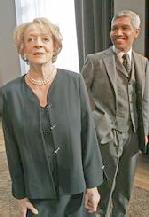SITE GUIDE
SEARCH
REVIEWS
FEATURES
NEWS
Etcetera and
Short Term Listings
LISTINGS
Broadway
Off-Broadway
NYC Restaurants
BOOKS and CDs
OTHER PLACES
Berkshires
London
California
New Jersey
DC
Philadelphia
Elsewhere
QUOTES
TKTS
PLAYWRIGHTS' ALBUMS
LETTERS TO EDITOR
FILM
LINKS
MISCELLANEOUS
Free Updates
Masthead
Writing for Us
A CurtainUp  London Review
London Review
 London Review
London ReviewThe Lady From Dubuque
|
I have come home for my daughter’s dying.
---- Elizabeth |

Maggie Smith as Elizabeth and Peter Francis James as Oscar
(Photo: John Haynes) |
The Lady From Dubuque almost falls into two different plays with its two acts very different in purpose and content. Act One is a domestic scene, a party where emaciated Jo (Catherine McCormack) is dying of cancer and uses a party to vent her anger on her guests. Her husband plays charades where he asks the question repeatedly, "Who am I" In a self conscious theatrical direction, the characters turn and address the audience in uncomfortable and action pausing asides. There is Jo’s husband, Sam (Robert Sella) who busies himself trying to care for Jo. Their friends, the waspish Lucinda (Vivienne Benesh) and philanthropic Edgar (Chris Larkin), red neck Fred (Glen Fleshler) with his new girlfriend, Carol (Jennifer Regan) are insulted and humiliated but not in an amusing or dramatic way. We are told that Albee was going through a period of alcoholism when he wrote this play and that of course is what Jo’s destructive behaviour seems to be, that of a vicious, mouthy drunk.
After all the guests have been baited and despatched, at the end of the first act there is the dramatic arrival of the mysterious woman (Maggie Smith) and her elegant and preening sidekick, Oscar (Peter Francis James). She claims to be Jo’s mother but is so far from the description that Jo has given of her New Jersey mother (fat, pink haired, never goes out) that this is simply not credible. Another explanation is that Jo is telling terrible lies, but this seems unlikely at a time when she has been embarrassingly frank and brutally honest about the limitations of each of her friends. Maggie Smith is meant to be from a very small place in Iowa but her English accent penetrates what little mid west accent she adopts. We conclude that the lady from Dubuque is in fact the angel of death here to comfort the dying Jo. The party guests drift back in but we are never quite sure why.
Peter Francis James is the most enjoyable aspect of this play although even he can get annoyingly repetitive in his camp pretension and his underlining of the prejudice afforded to black men. But I loved his dapper posing. He is always conscious of the audience’s reaction to his polished exterior and he looks flirtatiously towards the audience, aware of his handsome exterior and his designer suit. Maggie Smith does of course lend the piece some class. Much to Sam’s annoyance Jo does find some comfort in the arms of the lady from Dubuque as Maggie Smith manages to give comfort to the dying woman.
Hildegard Bechtler’s set has a fashionable and elegant Connecticut drawing room with the open staircase taking us up to another level but sadly the play stays grounded in the mire of pointlessness. The performances are good enough but wasted on a piece of Albee that should have been allowed to die quietly. The largely American cast seem to indicate that the play might have been Broadway bound. We shall see if it even makes a dozen performances.
|
THE LADY FROM DUBUQUE
Written by Edward Albee Directed by Anthony Page Starring: Maggie Smith, Catherine McCormack, Peter Francis James With: Vivienne Benesch, Robert Sells, Glenn Fleshler, Chris Larkin, Jennifer Regan Set Design: Hildegard Bechtler Costume Design: Amy Roberts Lighting: Howard Harrison Running time: 1 hour 45 minutes with one interval Box Office: 0870 400 0626 Booking to 9 June 2007 Reviewed by Lizzie Loveridge based on 21st March 2007 performance at the Theatre Royal, Haymarket, London SW1 (Tube: Piccadilly Circus) |
|
London Theatre Tickets Lion King Tickets Billy Elliot Tickets Mary Poppins Tickets Mamma Mia Tickets We Will Rock You Tickets Theatre Tickets |




